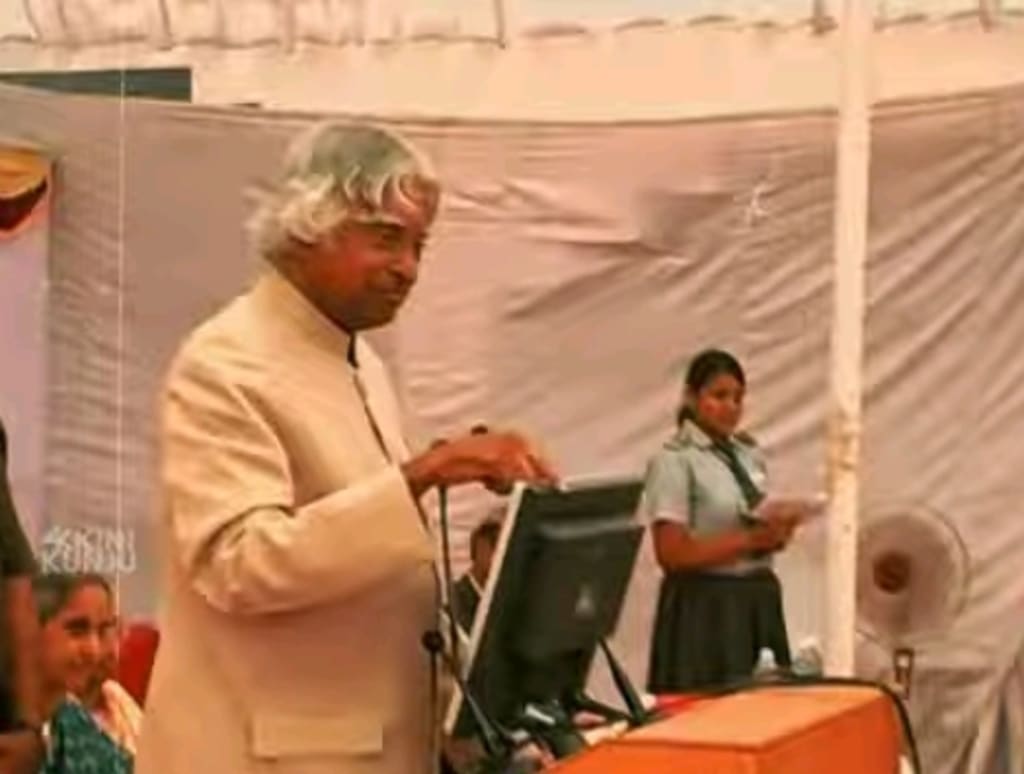Abdul Kalam's Rousing Life
Abdul Kalam, whose complete name was Avul Pakir Jainulabdeen Abdul Kalam, was a famous Indian researcher and legislator. He was brought into the world on October 15, 1931, in Rameswaram, an unassuming community in Tamil Nadu, India. Dr. Kalam is well known as the "Rocket Man of India" for his critical job in India's rocket improvement program.

Abdul Kalam's Rousing Life
Abdul Kalam, whose complete name was Avul Pakir Jainulabdeen Abdul Kalam, was a famous Indian researcher and legislator. He was brought into the world on October 15, 1931, in Rameswaram, an unassuming community in Tamil Nadu, India. Dr. Kalam is well known as the "Rocket Man of India" for his critical job in India's rocket improvement program.
Abdul Kalam hailed from a modest foundation, and his initial life was set apart by battles and difficulties. He experienced childhood in an unobtrusive climate and confronted monetary imperatives while seeking after his schooling. Be that as it may, his assurance, insight, and love for learning pushed him forward. Kalam got a degree in aeronautical designing from the Madras Establishment of Innovation and later sought after additional examinations in advanced plane design from the famous foundations in India.
Dr. Kalam's huge commitments lie in the field of safeguard and space research. He assumed a crucial part in the improvement of India's most memorable satellite send off vehicle (SLV-III) and the fruitful send off of the satellite "Rohini" into space. Kalam likewise drove the Coordinated Directed Rocket Improvement Program (IGMDP), where he assumed an essential part in the improvement of long range rockets, including the Agni and Prithvi rockets. His specialized brightness and administration abilities gained him massive appreciation and acknowledgment, both inside India and universally.
Aside from his accomplishments as a researcher, Abdul Kalam was a visionary chief and a rousing figure. He solidly had faith in outfitting science and innovation to assist society, especially in the fields of training, medical services, and provincial turn of events. Dr. Kalam supported for the utilization of innovation to connect the computerized partition and engage underestimated networks.
Abdul Kalam's gigantic information and insight made him a fantastic instructor and coach. He had a profound enthusiasm for supporting youthful personalities and was known for his collaborations with understudies and youth. Kalam underscored the significance of instruction, advancement, and constancy. His discourses and works were loaded up with persuasive experiences and a dream for a prosperous and comprehensive India.
In acknowledgment of his extraordinary commitments, Abdul Kalam was regarded with a few renowned honors, including the Bharat Ratna, India's most elevated non military personnel grant. He filled in as the eleventh Leader of India from 2002 to 2007, during which time he tried to associate with the residents, especially the adolescent, and motivate them to think beyond practical boundaries and buckle down.
Sadly, Abdul Kalam died on July 27, 2015, while conveying a talk at the Indian Establishment of The executives Shillong. His destruction left a void in the logical and political circles of India, yet his heritage keeps on rousing large number of individuals around the world.
Abdul Kalam's life process is a demonstration of the force of information, steadiness, and commitment. He exemplified the soul of a genuine researcher, pioneer, and visionary, making a permanent imprint on the areas of science, innovation, and schooling. Abdul Kalam's commitments and his obligation to a superior future will be for all time recalled, and he stays a dearest figure in the hearts of individuals all over the planet.
Abdul Kalam's residency as the Leader of India denoted a critical section in the nation's set of experiences. He was generally viewed as "Individuals' Leader" because of his practical nature, availability, and his capacity to interface with individuals from varying backgrounds. During his administration, Kalam zeroed in on advancing training, especially in provincial regions, and energized logical examination and advancement.
Kalam was a productive essayist and composed a few books, including "Wings of Fire," a collection of memoirs that portrays his initial life, his work in the Indian Space Exploration Association (ISRO) and Protection Innovative work Association (DRDO), and his vision for the nation's future. The book turned out to be tremendously well known and motivated endless people, particularly the young, to seek after their fantasies and defeat difficulties.
Notwithstanding his logical and political undertakings, Abdul Kalam was profoundly enthusiastic about ecological protection. He underscored the requirement for feasible turn of events and supported for the utilization of environmentally friendly power sources to alleviate environmental change. Kalam accepted that logical progressions ought to be lined up with environmental equilibrium and the prosperity of people in the future.
Abdul Kalam's lowliness, straightforwardness, and commitment to serving the country gained him the appreciation and profound respect of individuals from varying backgrounds. He was a good example for millions, and his life process keeps on moving endless people to take a stab at greatness and have a constructive outcome in the public eye.
Indeed, even after his passing, Abdul Kalam's heritage lives on through different drives and associations devoted to advancing instruction, advancement, and social government assistance. The Abdul Kalam Vision India Development (AKVIM) and the Abdul Kalam Establishment are among the organizations attempting to maintain his beliefs and proceed with his central goal of enabling the adolescent and driving public turn of events.
Abdul Kalam's life and work act as a brilliant illustration of how one person's assurance and enthusiasm can change their own life as well as the fate of a country. His commitments to science, training, and public advancement will always be esteemed, and his lessons will keep on directing ages to come.





Comments
There are no comments for this story
Be the first to respond and start the conversation.